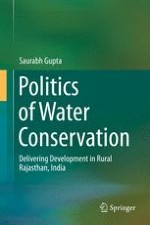2016 | OriginalPaper | Buchkapitel
2. Understanding the Politics of Watershed Development
verfasst von : Saurabh Gupta
Erschienen in: Politics of Water Conservation
Aktivieren Sie unsere intelligente Suche, um passende Fachinhalte oder Patente zu finden.
Wählen Sie Textabschnitte aus um mit Künstlicher Intelligenz passenden Patente zu finden. powered by
Markieren Sie Textabschnitte, um KI-gestützt weitere passende Inhalte zu finden. powered by
